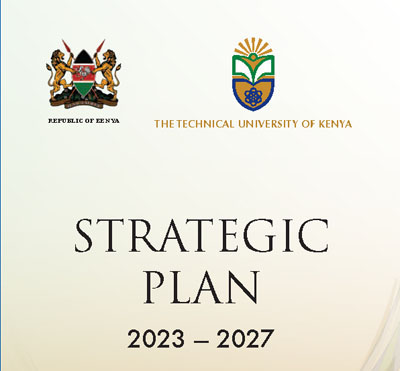On Thursday 10th April 2025, the Vice-Chancellor, Prof. Benedict Mutua, led the members of the Finance and General Purpose of the University Council on a comprehensive familiarisation tour of the institution's main facilities and sites. The purpose of the tour was to evaluate the University’s physical assets to inform strategic decisions on how they may be leveraged to enhance the revenue streams.
The delegation was led by Dr. Hassan Khannenje, who chaired the session, alongside Council Members, Mr. Joseph Ole Nkamasiai, Mr. Wilson Shollei, Mr. Justin Kabuiki, and Eng. Justin Runji. They were accompanied by members of the University Management Board, including Prof. Francis Gatheri, Acting Deputy Vice-Chancellor (Academics and Student Affairs), Prof. Alfred Orina, DVC (Research and Technology Development), Prof. Paul Wambua, DVC (Institutional Advancement and Enterprise), and Prof. Cleophas Maende, Dean of the Faculty of Engineering and Built Environment.
The programme commenced with an introductory session in the Conference Room, where Dr. Khannenje said TU-K possesses valuable strategic assets and infrastructure which, if utilized effectively, could serve as alternative revenue stream.
"As a Council, we have remained proactive. We continue to advocate for transparency and open communication among all university staff," Dr. Khannenje concluded.
During the main campus, the Council delegation visited the Clinic, Archives, Human Resource Services Registry, the Office of the Academic Registrar, the Examinations Office, and the office of the Association of Technical Universities and Polytechnics in Africa (ATUPA). The team also toured the ICT offices, Block T and Block I—both currently stalled projects, along with the Student Centre, the Mechanical Engineering workshops, Library, Main Canteen, and Block S.
The visit continued to the Men’s hostels in South B, where inspected the hostels, including the residential blocks, open grounds, laundry facilities, and dining areas.
During their stop at the South C property, Council members shared their preliminary vision for the site. Proposals included transforming part of the land into an entrepreneurship hub, establishing a recreational facility, and constructing high-rise apartments to accommodate university students, initiatives aimed at maximising the site's long-term value.
The final leg of the tour concluded at the Women’s Hostel in Upper Hill. The facility, which currently houses 153 students, was reported to be operating smoothly, with no major issues raised by staff. Prof. Omondi Oketch, Dean of Students, expressed his gratitude to the Council for their active engagement throughout the visit. He also acknowledged the dedication of the university’s leadership, accommodation and catering staff, and other personnel who contributed to the tour’s overall success.


